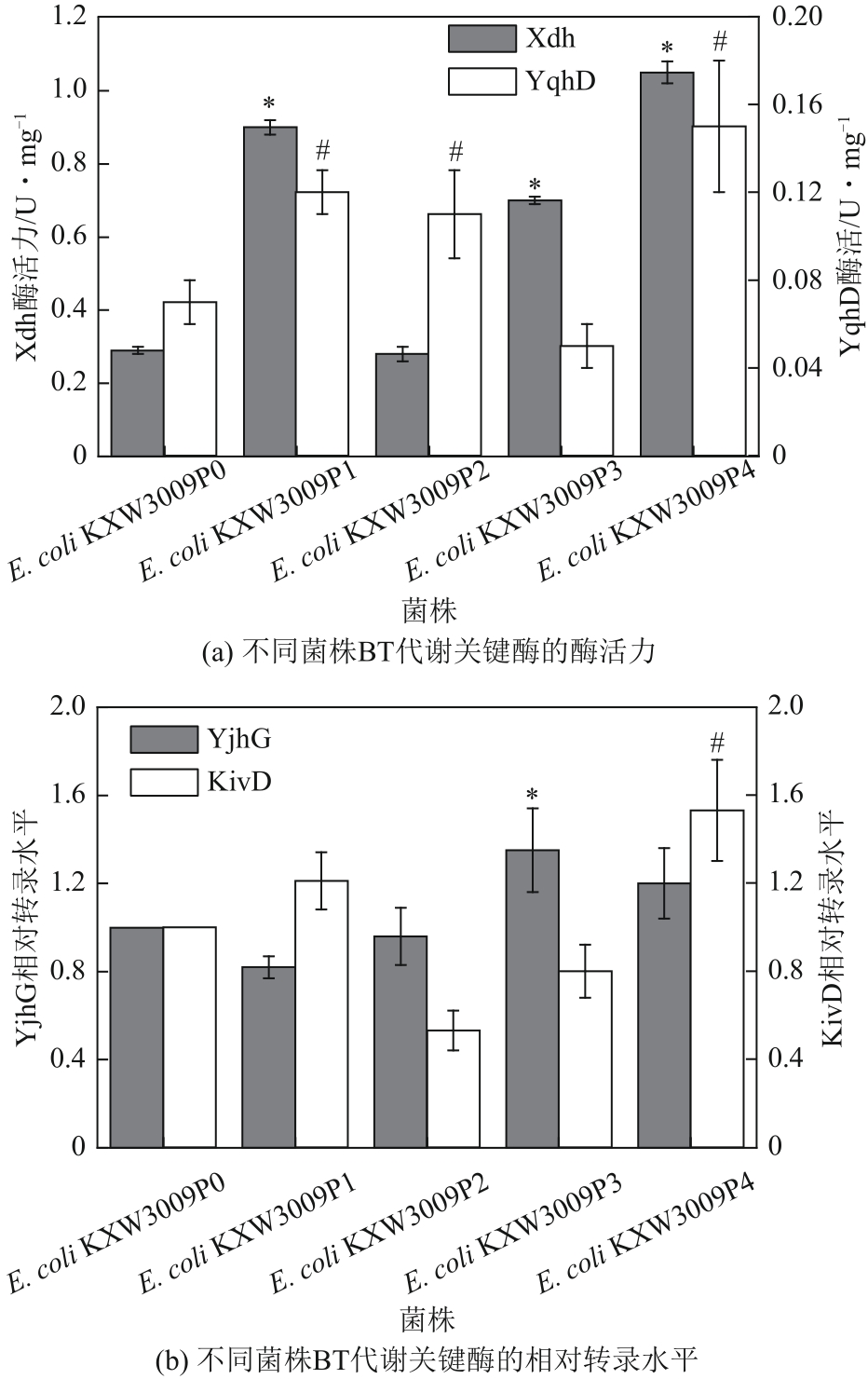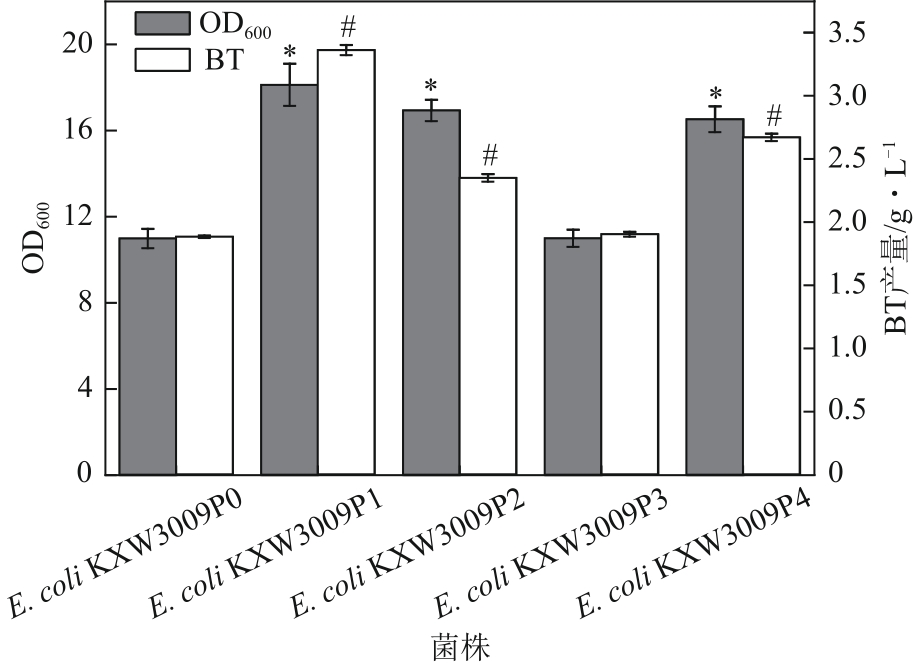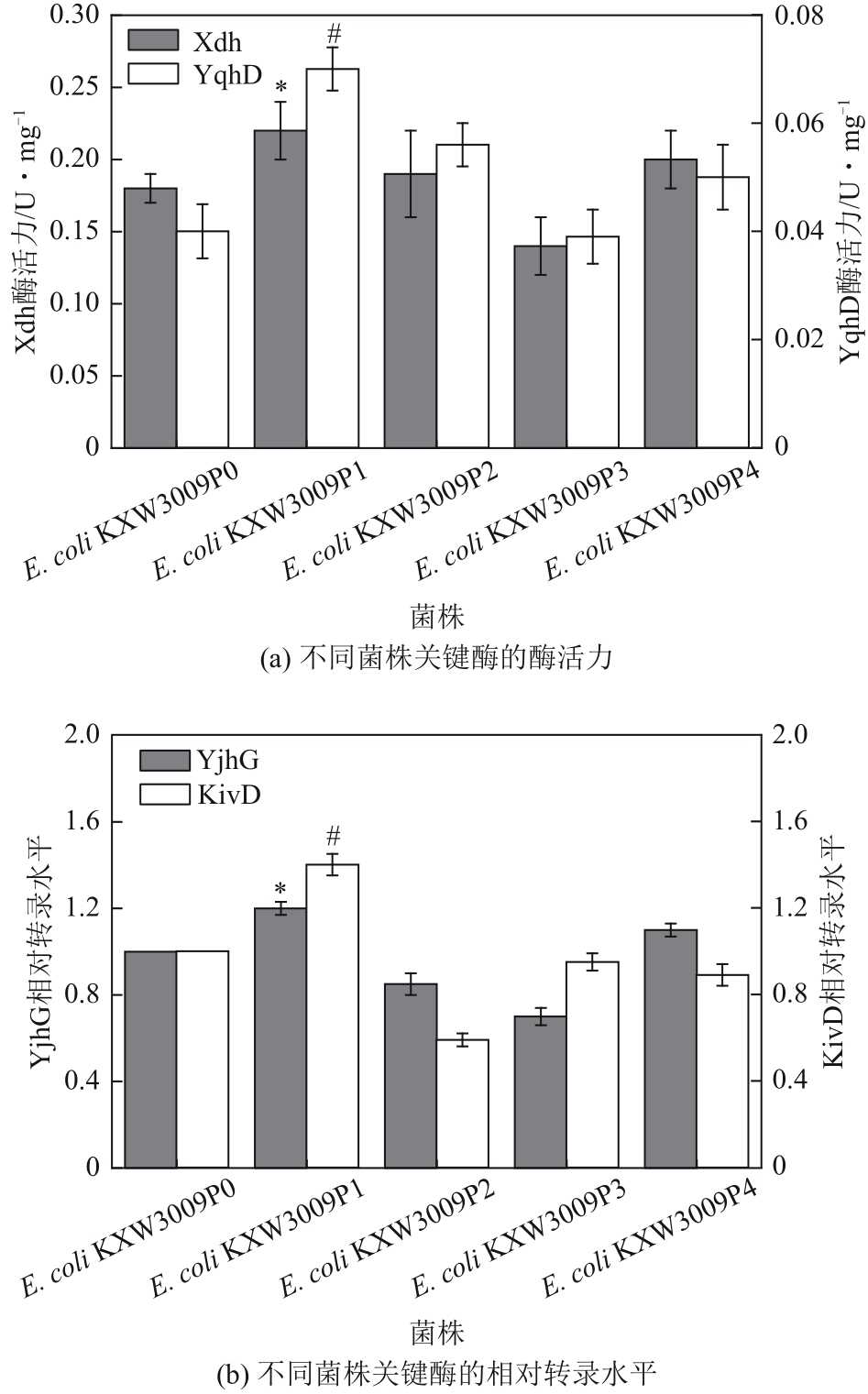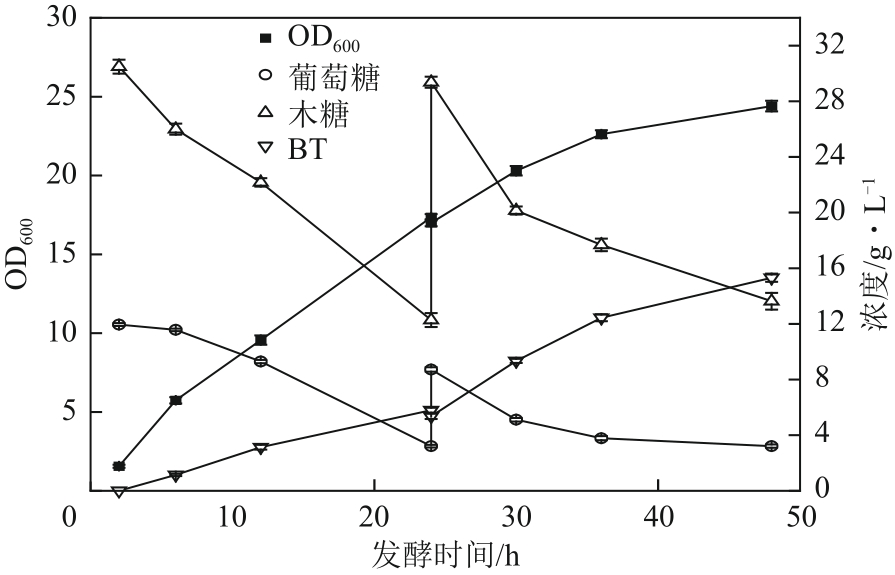Chemical Industry and Engineering Progress ›› 2024, Vol. 43 ›› Issue (2): 1063-1068.DOI: 10.16085/j.issn.1000-6613.2023-0298
• Biochemical and pharmaceutical engineering • Previous Articles
Genetic engineering modification to promote the synthesis of 1,2,4-butanetriol from cellulose hydrolysate of Escherichia coli
SHE Dan( ), WANG Shuting, LU Xinyao, ZONG Hong, ZHUGE Bin(
), WANG Shuting, LU Xinyao, ZONG Hong, ZHUGE Bin( )
)
- Key Laboratory of Industrial Biotechnology, Ministry of Education, Laboratory of Industrial Microorganisms, School of Biotechnology, Jiangnan University, Wuxi 214122, Jiangsu, China
-
Received:2023-03-01Revised:2023-08-15Online:2024-03-07Published:2024-02-25 -
Contact:ZHUGE Bin
基因工程改造促进大肠杆菌发酵纤维素水解液合成1,2,4-丁三醇
- 江南大学生物工程学院,工业生物技术教育部重点实验室,工业微生物研究中心,江苏 无锡 214122
-
通讯作者:诸葛斌 -
作者简介:佘丹(1998—),女,硕士研究生,研究方向为微生物代谢工程。E-mail:2744167136@qq.com。
CLC Number:
Cite this article
SHE Dan, WANG Shuting, LU Xinyao, ZONG Hong, ZHUGE Bin. Genetic engineering modification to promote the synthesis of 1,2,4-butanetriol from cellulose hydrolysate of Escherichia coli[J]. Chemical Industry and Engineering Progress, 2024, 43(2): 1063-1068.
佘丹, 王舒婷, 陆信曜, 宗红, 诸葛斌. 基因工程改造促进大肠杆菌发酵纤维素水解液合成1,2,4-丁三醇[J]. 化工进展, 2024, 43(2): 1063-1068.
share this article
Add to citation manager EndNote|Ris|BibTeX
URL: https://hgjz.cip.com.cn/EN/10.16085/j.issn.1000-6613.2023-0298
| 菌株和质粒 | 相关特点 | 来源 |
|---|---|---|
| E. coli KXW3009P0 | E. coli W3110ΔxylABΔyagEΔyjhHΔptsHIΔmgsA, pEtac-kivD-tac-xdh, pRSFDuettac-cm | 实验室保存 |
| E. coli KXW3009P1 | E. coli W3110ΔxylABΔyagEΔyjhHΔptsHIΔmgsA, pEtac-kivD-tac-xdh, pRSFDuettac-yghA | 本研究 |
| E. coli KXW3009P2 | E. coli W3110ΔxylABΔyagEΔyjhHΔptsHIΔmgsA, pEtac-kivD-tac-xdh, pRSFDuettac-thyA | 本研究 |
| E. coli KXW3009P3 | E. coli W3110ΔxylABΔyagEΔyjhHΔptsHIΔmgsA, pEtac-kivD-tac-xdh, pRSFDuettac-mdtJ-tac-mdtI | 本研究 |
| E. coli KXW3009P4 | E. coli W3110ΔxylABΔyagEΔyjhHΔptsHIΔmgsA, pEtac-kivD-tac-xdh, pRSFDuettac-pntA-tac-pntB | 本研究 |
| pEtac-kivD-tac-xdh | Kanr,tac启动子 | 实验室保存 |
| pRSFDuet-tac-cm | Cmr,tac启动子 | 实验室保存 |
| pRSFDuettac-yghA | Cmr,tac启动子 | 本研究 |
| pRSFDuettac-thyA | Cmr,tac启动子 | 本研究 |
| pRSFDuettac-mdtJ-tac-mdtI | Cmr,tac启动子 | 本研究 |
| pRSFDuettac-pntA-tac-pntB | Cmr,tac启动子 | 本研究 |
| 菌株和质粒 | 相关特点 | 来源 |
|---|---|---|
| E. coli KXW3009P0 | E. coli W3110ΔxylABΔyagEΔyjhHΔptsHIΔmgsA, pEtac-kivD-tac-xdh, pRSFDuettac-cm | 实验室保存 |
| E. coli KXW3009P1 | E. coli W3110ΔxylABΔyagEΔyjhHΔptsHIΔmgsA, pEtac-kivD-tac-xdh, pRSFDuettac-yghA | 本研究 |
| E. coli KXW3009P2 | E. coli W3110ΔxylABΔyagEΔyjhHΔptsHIΔmgsA, pEtac-kivD-tac-xdh, pRSFDuettac-thyA | 本研究 |
| E. coli KXW3009P3 | E. coli W3110ΔxylABΔyagEΔyjhHΔptsHIΔmgsA, pEtac-kivD-tac-xdh, pRSFDuettac-mdtJ-tac-mdtI | 本研究 |
| E. coli KXW3009P4 | E. coli W3110ΔxylABΔyagEΔyjhHΔptsHIΔmgsA, pEtac-kivD-tac-xdh, pRSFDuettac-pntA-tac-pntB | 本研究 |
| pEtac-kivD-tac-xdh | Kanr,tac启动子 | 实验室保存 |
| pRSFDuet-tac-cm | Cmr,tac启动子 | 实验室保存 |
| pRSFDuettac-yghA | Cmr,tac启动子 | 本研究 |
| pRSFDuettac-thyA | Cmr,tac启动子 | 本研究 |
| pRSFDuettac-mdtJ-tac-mdtI | Cmr,tac启动子 | 本研究 |
| pRSFDuettac-pntA-tac-pntB | Cmr,tac启动子 | 本研究 |
| 菌株 | 生物量OD600 | 葡萄糖消耗量 /g·L-1 | 木糖消耗量 /g·L-1 | BT /g·L-1 |
|---|---|---|---|---|
| E. coli KXW3009P0 | 14.2 | 9.8 | 27.0 | 14.8 |
| E. coli KXW3009P1 | 14.6 | 9.9 | 27.5 | 14.7 |
| E. coli KXW3009P2 | 14.8 | 8.9 | 27.8 | 13.2 |
| E. coli KXW3009P3 | 13.4 | 9.8 | 26.0 | 13.0 |
| E. coli KXW3009P4 | 14.9 | 9.0 | 28.1 | 14.9 |
| 菌株 | 生物量OD600 | 葡萄糖消耗量 /g·L-1 | 木糖消耗量 /g·L-1 | BT /g·L-1 |
|---|---|---|---|---|
| E. coli KXW3009P0 | 14.2 | 9.8 | 27.0 | 14.8 |
| E. coli KXW3009P1 | 14.6 | 9.9 | 27.5 | 14.7 |
| E. coli KXW3009P2 | 14.8 | 8.9 | 27.8 | 13.2 |
| E. coli KXW3009P3 | 13.4 | 9.8 | 26.0 | 13.0 |
| E. coli KXW3009P4 | 14.9 | 9.0 | 28.1 | 14.9 |
| 菌株 | 葡萄糖消耗量 /g·L-1 | 木糖消耗量 /g·L-1 | 木糖 转化率/% | 单位OD600的BT产量/g·L-1 |
|---|---|---|---|---|
| E. coli KXW3009P0 | 4.84 | 15.5 | 17.2 | 0.17 |
| E. coli KXW3009P1 | 7.79 | 20.4 | 23.4 | 0.19 |
| E. coli KXW3009P2 | 6.77 | 19.5 | 17.1 | 0.14 |
| E. coli KXW3009P3 | 4.66 | 14.4 | 18.7 | 0.17 |
| E. coli KXW3009P4 | 8.53 | 22.4 | 16.8 | 0.16 |
| 菌株 | 葡萄糖消耗量 /g·L-1 | 木糖消耗量 /g·L-1 | 木糖 转化率/% | 单位OD600的BT产量/g·L-1 |
|---|---|---|---|---|
| E. coli KXW3009P0 | 4.84 | 15.5 | 17.2 | 0.17 |
| E. coli KXW3009P1 | 7.79 | 20.4 | 23.4 | 0.19 |
| E. coli KXW3009P2 | 6.77 | 19.5 | 17.1 | 0.14 |
| E. coli KXW3009P3 | 4.66 | 14.4 | 18.7 | 0.17 |
| E. coli KXW3009P4 | 8.53 | 22.4 | 16.8 | 0.16 |
| 1 | 何姝颖, 诸葛斌, 陆信曜, 等. 副产物途径的缺失对大肠杆菌合成D-1,2,4-丁三醇的影响[J]. 微生物学通报, 2017, 44(1): 30-37. |
| HE Shuying, ZHUGE Bin, LU Xinyao, et al. Influence of the deficiency of by-product pathways on biosynthesis of D-1,2,4-butanetriol in Escherichia coli [J]. Microbiology China, 2017, 44(1): 30-37. | |
| 2 | 孙雷, 杨帆, 朱泰承, 等. 大肠杆菌合成1,2,4-丁三醇的途径优化[J]. 生物工程学报, 2016, 32(1): 51-63. |
| SUN Lei, YANG Fan, ZHU Taicheng, et al. Optimization of 1,2,4-butanetriol synthetic pathway in Escherichia coli [J]. Chinese Journal of Biotechnology, 2016, 32(1): 51-63. | |
| 3 | 景培源. 多策略强化1,2,4-丁三醇的生物合成[D]. 无锡: 江南大学, 2018. |
| JING Peiyuan. Enhanced 1,2,4-butanetriol bioproduction by mutistrategy[D]. Wuxi: Jiangnan University, 2018. | |
| 4 | 李永莲, 阳元娥, 黎妍文, 等. 不同预处理方法下玉米芯水解效果的比较研究[J]. 中原工学院学报, 2018, 29(4): 24-28. |
| LI Yonglian, YANG Yuane, LI Yanwen, et al. Comparative study of the effect of hydrolysis of corn cob by different pretreatment methods[J]. Journal of Zhongyuan University of Technology, 2018, 29(4): 24-28. | |
| 5 | HEER Dominik, SAUER Uwe. Identification of furfural as a key toxin in lignocellulosic hydrolysates and evolution of a tolerant yeast strain[J]. Microbial Biotechnology, 2008, 1(6): 497-506. |
| 6 | GLEBES Tirzah Y, SANDOVAL Nicholas R, REEDER Philippa J, et al. Genome-wide mapping of furfural tolerance genes in Escherichia coli [J]. PLoS One, 2014, 9(1): e87540. |
| 7 | ZHAO Meilin, SHI Dingchang, LU Xinyao, et al. Ethanol fermentation from non-detoxified lignocellulose hydrolysate by a multi-stress tolerant yeast Candida glycerinogenes mutant[J]. Bioresource Technology, 2019, 273: 634-640. |
| 8 | ATSUMI Shota, WU Tung Yun, ECKL Eva Maria, et al. Engineering the isobutanol biosynthetic pathway in Escherichia coli by comparison of three aldehyde reductase/alcohol dehydrogenase genes[J]. Applied Microbiology and Biotechnology, 2010, 85(3): 651-657. |
| 9 | Bilal JILANI S, PRASAD Rajendra, YAZDANI Syed Shams. Overexpression of oxidoreductase YghA confers tolerance of furfural in ethanologenic Escherichia coli strain SSK42[J]. Applied and Environmental Microbiology, 2021, 87(23): e0185521. |
| 10 | ZHENG Huabao, WANG Xuan, YOMANO Lorraine P, et al. Increase in furfural tolerance in ethanologenic Escherichia coli LY180 by plasmid-based expression of thyA [J]. Applied and Environmental Microbiology, 2012, 78(12): 4346-4352. |
| 11 | KURGAN Gavin, PANYON Larry A, Yesenia RODRIGUEZ-SANCHEZ, et al. Bioprospecting of native efflux pumps to enhance furfural tolerance in ethanologenic Escherichia coli [J]. Applied and Environmental Microbiology, 2019, 85(6). |
| 12 | WANG Xuan, YOMANO Lorraine P, LEE James Y, et al. Engineering furfural tolerance in Escherichia coli improves the fermentation of lignocellulosic sugars into renewable chemicals[J]. Proceedings of the National Academy of Sciences of the United States of America, 2013, 110(10): 4021-4026. |
| 13 | CANDIDO João Paulo, CLARO Elis Marina Turini, DE PAULA Carolina Bilia Chimello, et al. Detoxification of sugarcane bagasse hydrolysate with different adsorbents to improve the fermentative process[J]. World Journal of Microbiology and Biotechnology, 2020, 36(3): 43. |
| 14 | LU Xinyao, HE Shuying, ZONG Hong, et al. Improved 1,2,4-butanetriol production from an engineered Escherichia coli by co-expression of different chaperone proteins[J]. World Journal of Microbiology and Biotechnology, 2016, 32(9): 149. |
| 15 | 郭超, 冯奥, 陆信曜, 等. 重组大肠杆菌1,2,4-丁三醇合成途径的平衡优化[J]. 化工进展, 2022, 41(12): 6531-6539. |
| GUO Chao, FENG Ao, LU Xinyao, et al. Balanced optimization of the 1,2,4-butanetriol synthesis pathway in recombinant Escherichia coli [J]. Chemical Industry and Engineering Progress, 2022, 41(12): 6531-6539. | |
| 16 | SEO Hyung-Min, JEON Jong-Min, LEE Ju Hee, et al. Combinatorial application of two aldehyde oxidoreductases on isobutanol production in the presence of furfural[J]. Journal of Industrial Microbiology and Biotechnology, 2016, 43(1): 37-44. |
| 17 | JING Peiyuan, CAO Xi, LU Xinyao, et al. Modification of an engineered Escherichia coli by a combined strategy of deleting branch pathway, fine-tuning xylose isomerase expression, and substituting decarboxylase to improve 1,2,4-butanetriol production[J]. Journal of Bioscience and Bioengineering, 2018, 126(5): 547-552. |
| 18 | SAUER Uwe, CANONACO Fabrizio, HERI Sylvia, et al. The soluble and membrane-bound transhydrogenases udhA and pntAB have divergent functions in NADPH metabolism of Escherichia coli [J]. Journal of Biological Chemistry, 2004, 279(8): 6613-6619. |
| 19 | LEE S Y. High cell-density culture of Escherichia coli [J]. Trends in Biotechnology, 1996, 14(3): 98-105. |
| 20 | 狄莹莹, 王昕钰, 冯奥, 等.大肠杆菌乙酸弱化对1,2,4-丁三醇合成的影响[J]. 食品与发酵工业, 2021, 47(19): 29-34. |
| DI Yingying, WANG Xinyu, FENG Ao, et al.Improved 1,2,4-butanetriol production by weaken acetate pathway in a recombinant Escherichia coli [J]. Food and Fermentation Industries, 2021, 47(19): 29-34. |
| [1] | GAO Cong, CHEN Chenghu, CHEN Xiulai, LIU Liming. Progress and challenges of engineering microorganisms to produce biobased monomers [J]. Chemical Industry and Engineering Progress, 2023, 42(8): 4123-4135. |
| [2] | XIAO Yaoxin, ZHANG Jun, HU Sheng, SHAN Rui, YUAN Haoran, CHEN Yong. Cu-Zn catalyzed hydrogenation of furfural with methanol as hydrogen donor [J]. Chemical Industry and Engineering Progress, 2023, 42(3): 1341-1352. |
| [3] | ZHUANG Yuting, WANG Jianhua, XIANG Zhiyan, ZHAO Juan, XU Qiong, LIU Xianxiang, YIN Dulin. Research progress in preparation and kinetics of γ-valerolactone synthesis from hemicellulose and its derivatives [J]. Chemical Industry and Engineering Progress, 2022, 41(7): 3519-3533. |
| [4] | LYU Xiaoqi, LI Hong, ZHAO Zhenyu, LI Xingang, GAO Xin, FAN Xiaolei. Microwave-assisted carbon-based catalysts for fructose dehydration to 5-hydroxymethylfurfural [J]. Chemical Industry and Engineering Progress, 2022, 41(2): 637-647. |
| [5] | GUO Chao, FENG Ao, LU Xinyao, ZONG Hong, ZHUGE Bin. Balanced optimization of the 1,2,4-butanetriol synthesis pathway in recombinant Escherichia coli [J]. Chemical Industry and Engineering Progress, 2022, 41(12): 6531-6539. |
| [6] | MU Shiyun, LIU Kai, LYU Xiaoqi, JIAO Yilai, LI Xingang, LI Hong, FAN Xiaolei, GAO Xin. Conversion of fructose to 5-hydroxymethylfurfural catalyzed by microwave-assisted zirconia@carbon nanotubes [J]. Chemical Industry and Engineering Progress, 2022, 41(11): 5858-5869. |
| [7] | HE Guangli, DOU Meiling. Progress on effect of hydrogen impurities on the performance of automotive fuel cells [J]. Chemical Industry and Engineering Progress, 2021, 40(9): 4815-4822. |
| [8] | YU Xue, BAO Qingqing, GAO Shuang, ZHANG Yuewei. Research progresses on supported precious metal catalysts for base-free aerobic oxidation of 5-hydroxymethylfurfural to 2,5-furandicarboxylic acid [J]. Chemical Industry and Engineering Progress, 2021, 40(7): 3760-3771. |
| [9] | TAO Yuxuan, ZHANG Shangjie, JING Yiwen, XIN Fengxue, DONG Weiliang, ZHOU Jie, JIANG Yujia, ZHANG Wenming, JIANG Min. Recent advances in the construction strategy of methylotrophic Escherichia coli [J]. Chemical Industry and Engineering Progress, 2021, 40(7): 3932-3941. |
| [10] | LI Yang, ZHU Chenhui, FAN Daidi. Green biological manufacture and application of recombinant collagen [J]. Chemical Industry and Engineering Progress, 2021, 40(3): 1262-1275. |
| [11] | Tong WANG, Hualiang AN, Fang LI, Wei XUE, Yanji WANG. Research progress of the heterogeneous catalysts for 2,5-dimethylfuran synthesis via hydrogenolysis of 5-hydroxymethylfufural [J]. Chemical Industry and Engineering Progress, 2021, 40(2): 824-834. |
| [12] | Chongyang GUO, Yugao WANG, Jun SHEN, Yanxia NIU, Gang LIU, Qingtao SHENG. Research progress on synthesis of 2,5-furandicarboxylic acid from biomass-derived raw materials [J]. Chemical Industry and Engineering Progress, 2021, 40(2): 1008-1017. |
| [13] | QIAN Jiayi, XIAO Jianjun, SUN Lin, YANG Haiping, WANG Xianhua, CHEN Yingquan, CHEN Hanping. Research progress on process intensification in hydrolysis of biomass into 5-hydroxymethylfurfural in biphasic solvent systems [J]. Chemical Industry and Engineering Progress, 2021, 40(11): 6054-6060. |
| [14] | Chunshan ZHU,Zhengxin MAO,Lin GAO. Preparation of furfural residue lignin/poluethyleneimine microspheres [J]. Chemical Industry and Engineering Progress, 2020, 39(4): 1550-1557. |
| [15] | Lu CHEN,Dingyu LIU,Baowei WANG,Yu jiao ZHAO,Guangtao JIA,Tao CHEN,Zhiwen WANG. Advances in acetyl coenzyme A metabolic engineering with Escherichia coli [J]. Chemical Industry and Engineering Progress, 2019, 38(9): 4218-4226. |
| Viewed | ||||||
|
Full text |
|
|||||
|
Abstract |
|
|||||





